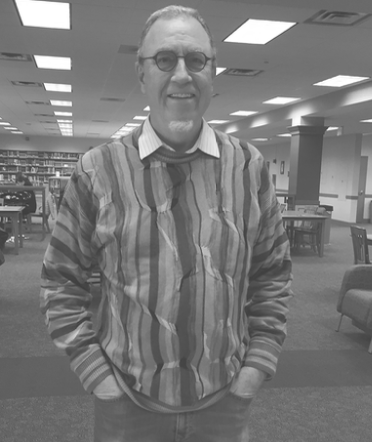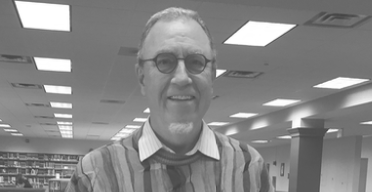By Anand Venigalla
Staff Writer
It began in the bathtub. After years of dealing with the haunting childhood memories and repercussions of abuse in his foster home from the age of 3, David Hinchliffe, an adjunct English professor, revealed to The Pioneer that he is ready to recover.
“Looking back, I was somewhat like an emotional prisoner – trapped in a dysfunctional home in which no love was expressed to me,” he shared. Hinchcliffe experienced the “quieter, often underappreciated form of abuse,” when his foster guardian – he doesn’t use the term “mother” – neglected him and failed to care for his needs. “I felt like a thing,” he said. “Separate from ‘others’ who I thought of as ‘normal.’”

Hinchcliffe was abused in the bathtub by his foster guardian until he was 11 years old. This lead to a severe terror of water. “I confess that to this day I still get nervous, grip the car’s steering wheel more tightly,” he said, sharing his anxiety with driving over spans of water.
His foster guardian was only the beginning, as Hinchcliffe was abused by her grandson, who was two years older than him. He was just 13 years old when the grandson attempted to rape him, but Hinchcliffe somehow found the strength to fight off his advances.
Other members of the household – Pop, the abuser’s husband, and Jean, her unmarried, disabled daughter – were co-conspirators in the abuses. They stood by and did and said nothing, Hinchcliffe said.
Hinchcliffe utilizes his artistic creativity to explore his journey of recovery from abuse and to give hope to survivors of abuse. Hinchliffe wants to use his story to educate the world about post-traumatic stress disorder.
“I consider the phase I’m now in [to be] the ‘healing phase.” Hinchliffe perceives that his creativity will be used more through speaking, though he’s open to various avenues of creativity, whether through a book, a blog, or a podcast. “It’s all evolving,” he said.
The healing phase is complex for Hinchliffe. “It’s both extremely joyful and can fill me with a sense of contentment and gratitude for surviving and thriving and still being around to explore and expand and grow. Yet also challenging, to my emotions, to my way of dealing with myself. We have a mantra in the trauma community that says, ‘Be gentle with yourselves.’”
Hinchliffe coped with his experiences through music, sports, and nature. For abuse survivors, he advised involvement in the arts. “For anyone trying to survive, I highly suggest they get into the arts and anything that has [them] moving. It’s really helpful. It’s hard to explain.”
Hinchliffe also had some words of advice and comfort for survivors of abuse. “I think the first thing is don’t put too much pressure on yourself to do anything except to keep on going. When you are ready, maybe to talk about it and find the resources that help you, like a good therapist, a support group, even something online.” He advises survivors that when they are ready, to try to explain to loved ones as simply as possible, with as little emotion as possible. “You are a deserving, growing plant, and pay attention to the details of all that,” he said.
Regarding recent allegations against movie mogul Harvey Weinstein and U.S. Senate candidate Roy Moore, including other allegations, Hinchliffe expressed certain caution about change. “Change is glacial, in my opinion; so I’m happy to see more discussion, more attempt at openness; but we have a ways to go.”
As for why abuse victims wait to report abuse, Hinchliffe stated that memory of trauma is not like other forms of memory. “The memory is in the body, and it affects the body. But the limbic brain, where memory is normally stored, is not [conscious] of what it feels in the body and what the event was. I think that’s why people take so long to report. They don’t have the language and they don’t have the perspective as to what happened to them.”




Be First to Comment